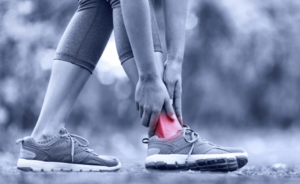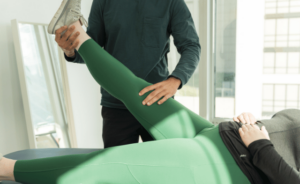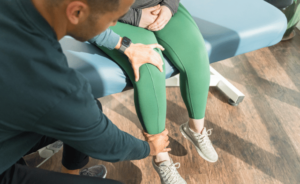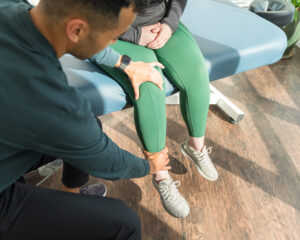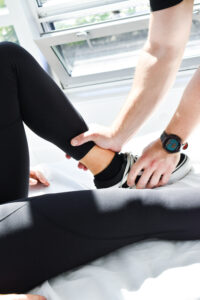As one of the leading physiotherapy clinics in downtown Vancouver, we specialize in treating running injuries and preventing them from sidelining your training. Running is popular in Vancouver, thanks to our scenic landscapes and beautiful running trails, from the Seawall to Stanley Park. However, with this popularity comes the unfortunate reality that many Vancouverites experience running-related injuries.
According to Canadian Running Magazine, over 50% of runners will likely experience an injury in any given year. The combination of frequent running, Vancouver’s varied terrain, and weather conditions places runners at higher risk for certain injuries. Let’s dive into the five most common running injuries in Vancouver and share tips on how you can prevent them.
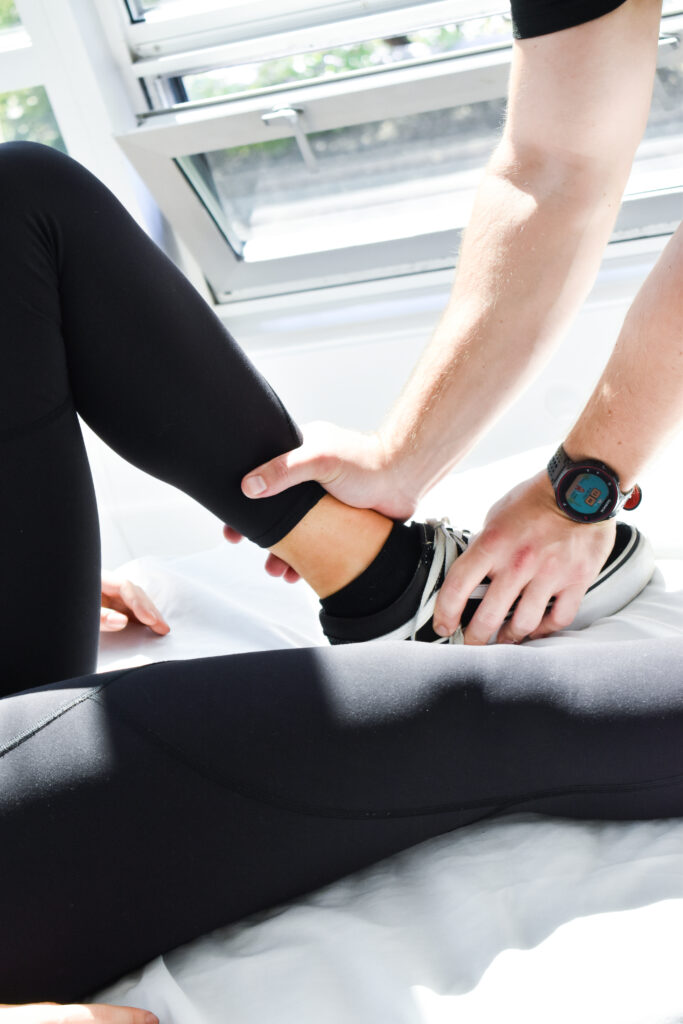
IT Band Syndrome (Iliotibial Band Syndrome)
What is IT Band Syndrome?
IT Band Syndrome occurs when the iliotibial (IT) band, a thick band of fascia running along the outside of your thigh from hip to knee, becomes inflamed or irritated. This condition often causes pain on the outer side of the knee, especially in runners due to repetitive knee movements.
Why It Happens
In Vancouver, IT Band Syndrome is common among runners because of overtraining, uneven surfaces like hilly terrain, improper footwear, and muscle imbalances.
How to Prevent IT Band Syndrome
- Strengthen Your Hips, Glutes & Hamstrings: Focus on strengthening your glutes, hip abductors, and core muscles to prevent your IT band from overcompensating.
- Improve Flexibility: Regularly stretch the IT band, hamstrings, and quadriceps. Yoga can also help maintain flexibility.
- Foam Roll: Use a foam roller to release tension in your IT band and surrounding muscles, especially after running on Vancouver’s challenging trails.
- Wear Proper Footwear: Invest in running shoes that provide adequate support and cushioning for running on varied surfaces.
- Gradual Training Progression: Avoid sudden increases in mileage or intensity. Follow a structured plan that allows your body to adapt. If you’re unsure what that should look like, let one of our physiotherapists help you!
Achilles Tendinitis
What is Achilles Tendinitis?
Achilles tendinitis involves inflammation of the Achilles tendon, which connects your calf muscles to your heel. This condition causes pain and stiffness in the lower leg and is common among runners who increase their training intensity too quickly.
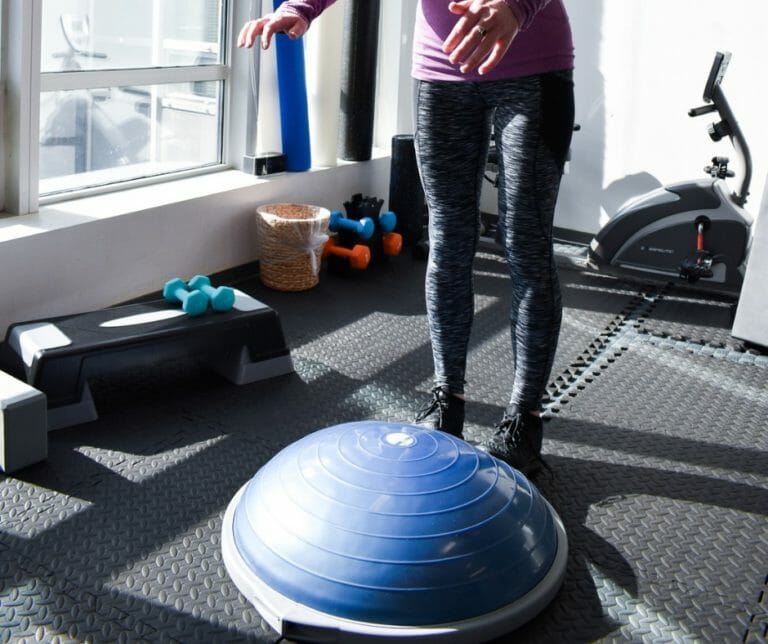
Why It Happens
In Vancouver, runners who frequently run uphill or on hard surfaces, such as concrete, are more susceptible to Achilles tendinitis, especially if they have tight calf muscles or wear improper footwear.
How to Prevent Achilles Tendinitis
- Strengthen Calf Muscles: Exercises like heel raises will build resilience in your Achilles tendon.
- Stretch Regularly: Stretch your calves and Achilles tendon before and after runs to maintain flexibility.
- Rest Days: Allow time for recovery, especially after intense runs in Vancouver’s hilly regions.
- Proper Footwear: Invest in shoes with good arch support and cushioning, particularly if you have flat feet or high arches.
- Avoid Overtraining: Gradually increase your running distance to allow your Achilles to adapt to the stress.
Runner’s Knee (Patellofemoral Pain Syndrome)
What is Runner’s Knee?
Runner’s knee, also known as patellofemoral pain syndrome, involves pain around the kneecap. It is often caused by muscle imbalances, overuse, or improper running form, all of which stress the knee joint.
Why It Happens
Vancouver’s hilly terrain and frequent downhill running can place extra strain on the knees, making runner’s knee a common issue for local runners. Muscle imbalances or improper form also contribute to this injury.
How to Prevent Runner’s Knee
- Strengthen Quadriceps and Glutes: Focus on building strength in your quadriceps and glutes to support proper kneecap alignment.
- Stretch Lower Body Muscles: Regularly stretch your hamstrings and calves to prevent tightness and reduce strain on the knees.
- Correct Running Form: Ensure proper knee tracking during your runs. A physiotherapist can assess and correct your form if needed.
- Progress Gradually: Avoid overloading your knees by following a gradual training progression.
- Wear Knee Support: If you are prone to knee issues, consider using a knee brace or taping your knee during runs.
Piriformis Syndrome
What is Piriformis Syndrome?
Piriformis syndrome occurs when the piriformis muscle in the buttocks becomes tight or spasms, irritating the nearby sciatic nerve. This condition often causes pain that radiates down the leg.
Why It Happens
Vancouver runners may experience piriformis syndrome due to overuse, weak glutes, or poor running mechanics. Long periods of sitting during workdays can also cause the piriformis to tighten, contributing to this condition.
How to Prevent Piriformis Syndrome
- Strengthen Your Glutes and Core: Focus on exercises that build glute and core strength to improve stability and prevent piriformis strain.
- Stretch the Piriformis: Regularly stretch the piriformis muscle to maintain flexibility. A seated or lying stretch can be particularly effective.
- Cross-Train: Reduce overuse by incorporating low-impact activities like swimming or cycling into your routine.
- Improve Running Mechanics: Work on your running posture and mechanics to avoid strain on the hips and buttocks.
- Foam Roll: After long runs, use a foam roller to massage the piriformis and surrounding muscles.
Plantar Fasciitis
What is Plantar Fasciitis?
Plantar fasciitis is the inflammation of the plantar fascia, a thick band of tissue running along the bottom of your foot. It causes sharp, stabbing pain, often felt in the heel, particularly after long periods of rest or after running.
Why It Happens
Plantar fasciitis is common among Vancouver runners due to the repetitive impact on hard surfaces in urban areas. Tight calf muscles, improper footwear, or running on hard terrain increase the risk.
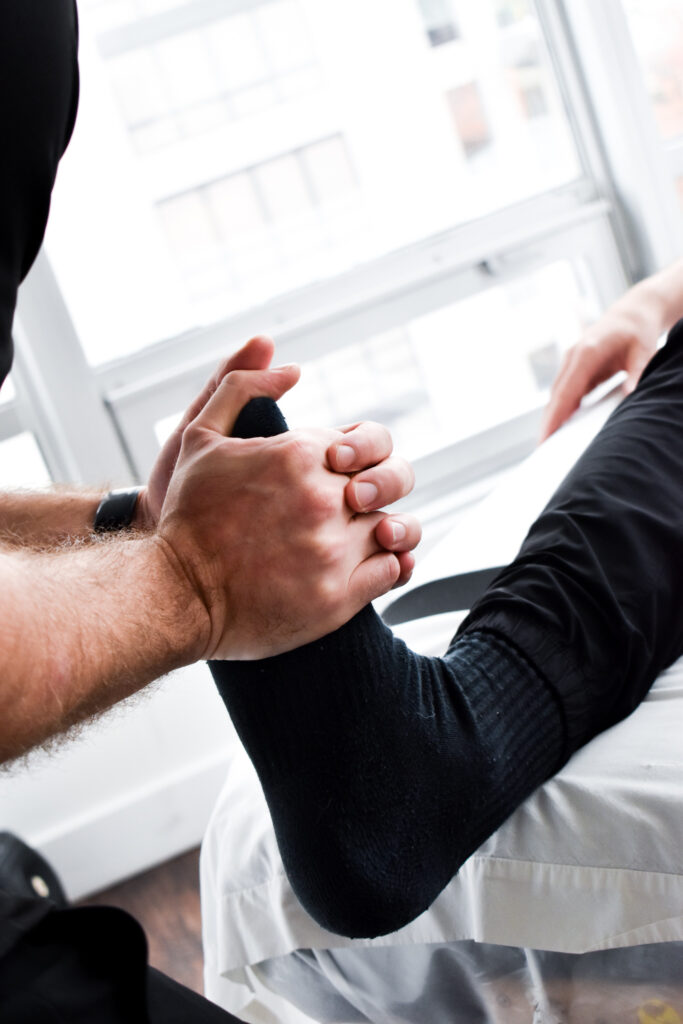
How to Prevent Plantar Fasciitis
- Stretch Calves and Achilles: Stretch your calves and Achilles tendon to reduce tension on the plantar fascia.
- Strengthen Foot Muscles: Engage in foot-strengthening exercises like toe curls to support the plantar fascia.
- Wear Supportive Footwear: Invest in shoes that offer good arch support and cushioning, particularly for running on Vancouver’s hard surfaces.
- Avoid Overtraining: Gradually increase your running distance to avoid overloading your feet.
- Cross-Train: Include low-impact activities like cycling or swimming to give your feet a break from the repetitive impact of running.
Frequently Asked Questions (FAQs)
- What are the most common running injuries?
The most common running injuries include IT Band Syndrome, Achilles tendinitis, runner’s knee, piriformis syndrome, and plantar fasciitis. These injuries often result from overuse, improper footwear, muscle imbalances, or running on uneven surfaces. - How can physiotherapy help with running injuries?
Physiotherapy helps by addressing the root causes of running injuries, such as muscle imbalances, poor biomechanics, and overuse. A physiotherapist will assess your condition and provide personalized treatment plans, including exercises to strengthen weak muscles, manual therapy, and advice on improving running form to prevent future injuries. - How can I prevent running injuries?
To prevent running injuries, focus on proper warm-ups and cool-downs, strength training, stretching key muscles (like the calves and hamstrings), and gradually increasing your running distance. Wearing the right shoes and paying attention to your running mechanics are also essential. - How long does it take to recover from a running injury?
Recovery time depends on the severity of the injury and how quickly you seek treatment. Mild injuries might take a few weeks to heal, while more severe injuries, such as Achilles tendinitis or plantar fasciitis, can take several months. Physiotherapy can expedite the healing process by providing targeted exercises and treatment. - When should I see a physiotherapist for a running injury?
You should see a physiotherapist if you experience persistent pain or discomfort during or after running that doesn’t improve with rest, stretching, or other home remedies. Early intervention can prevent injuries from worsening and reduce recovery time. - Can physiotherapy help improve my running performance?
Yes! Physiotherapists can help identify any weaknesses or imbalances that may affect your running form and performance. By addressing these issues through strengthening exercises and correcting your biomechanics, you can improve your efficiency, reduce the risk of injury, and enhance your overall running performance.
Conclusion
Running injuries are frustrating, but with the right approach, they are preventable. As Vancouver’s leading physiotherapy clinic, our expert physiotherapists specialize in sports physiotherapy and can help you recover from running injuries or develop personalized strategies to prevent them. Whether you’re training for a race or enjoying a casual run through Vancouver’s scenic routes, we’re here to keep you running pain-free.
Struggling with running injuries in Vancouver? Book a consultation with our downtown Vancouver physiotherapists to recover and stay injury-free!





